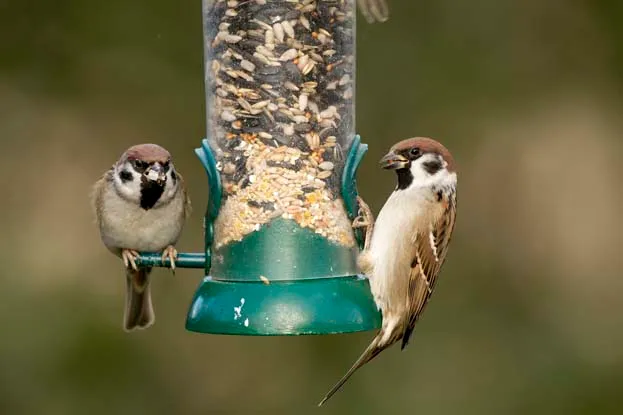What do tree sparrows look like?
Tree sparrows are smaller than house sparrows and have a warm red-brown crown (house sparrows have a grey crown), white patches to the side of the head and a small black cheek patch. Their wings are chestnut brown and black patterned, while their underside is white-very pale brown.
Males and female look similar.
How big is a tree sparrow?
Tree sparrows are around 14cm in length, and weigh between 19-25g. Their wingspan is 20-22cm
Where do tree sparrows live?
While its cousin, the house sparrow, has historically dominated urban areas, the tree sparrow is typically found in lowland countryside preferring land suitable for growing crops. If you live in northeast England and eastern Scotland, tree sparrows may be more familiar to you than house sparrows, which have undergone significant losses in southeast England, South Wales and the Pennines.
Elsewhere in the world, tree sparrows are more common and are often found in urban areas, living alongside house sparrows. As with house sparrows, humans tried to introduce them to new countries, such as New Zealand and Australia, but the tree sparrows did not survive. However, there is a thriving, isolated population in Missouri, USA, where they did adapt to new conditions.
What do tree sparrows eat?
In the summer, tree sparrows supplement their diet with invertebrates, but year-round they feed on seeds of arable weeds. With a loss of winter stubble, and possibly wetlands, they are losing their main food source and therefore struggle to survive the winter.

Tree sparrows will come into gardens in the winter for supplementary food. John Harding/BTO
It is potentially due to this loss of food, that you are more likely to see tree sparrows in gardens during the winter, where they will make the most of foods such as mixed seed, fat and peanuts. While they prefer to feed on the ground, they will also use bird tables and hanging feeders.
Do tree sparrows mate for life?
Yes they do. Tree sparrows are one of a few species that mate for life, however live in colonies of of 10 to 50 pairs.
When do tree sparrows breed?
Tree sparrows will also nest in some rural gardens. They don’t lay their eggs until May but may breed well into August, having two or three broods. They nest in loose colonies of 10 to 50 pairs, but just over one third of these will be adults from previous years, with the majority of birds having joined from other colonies.
Do tree sparrows migrate?
While mostly sedentary, tree sparrows have occasionally crossed the Channel. Ringed birds have been found in Belgium, Germany, France and the Netherlands. Some mainland European birds have also crossed over to the UK.
Why are numbers declining?
The tree sparrow decline started in the 1970s, and even with recent increases, the population consists of fewer than 10 per cent of those present in the late 1960s. This decline, like that of most farmland birds, is linked to agricultural changes and reduced overwinter survival.
The British Trust of Ornithology (BTO) works in partnership with over 40,000 volunteer birdwatchers to chart the fortunes of UK birds.
Among the surveys that we coordinate is our popular Garden BirdWatch, the largest year-round survey of garden birds in the world.
Main image: Tree sparrow © John Harding/BTO

